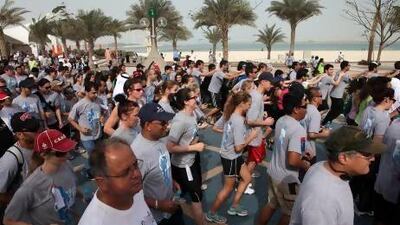There's a lot we can learn from the late Terry Fox, who raised millions with his 1980 Marathon of Hope and inspired the world's largest annual one-day fundraiser for cancer research. As thousands of runners and walkers prepare for the 18th Annual Abu Dhabi Terry Fox Run on Friday, aiming to beat last year's fundraising haul of more than Dh267,000, here are six enduring lessons from the life of the Canadian hero.
Stick to your guns
Fox was a competitive guy, but when the founder and chief executive of the Four Seasons Hotel and Resorts, Isadore Sharp, approached him with the idea of an annual fundraising run in his name, he insisted that it be inclusive - with no winners or losers. After Fox succumbed to cancer in 1981 before finishing his goal of crossing Canada, Sharp had to insist on sticking to the original vision of the run even as the Canadian Cancer Society suggested the event would take money and attention away from its other campaigns, and other charities worried it would leave less money for them. It's a good thing he did - the non-competitive nature of the Terry Fox run is one of the reasons it's so successful today.
Ignore the haters
Even Fox had haters, doubters and naysayers following him on his cross-country run. As Marathon of Hope started to gain media attention, responses ranged from the concerned to the cruel. A broadcaster called him "a three-legged horse who should be stopped". A newspaper ran an editorial with the headline "Give it up Terry". But the one that got under Fox's skin was an article in The Globe and Mail, Canada's newspaper of record, that claimed he verbally abused his brother and was motivated by a grudge against a doctor who had misdiagnosed him. Fox didn't waste time worrying about it - he called the allegations "trash" then kept running.
You don't need fancy gear
For most of his run, Fox wore a basic "Marathon of Hope" T-shirt - at the beginning they verged on homemade-looking - paired with grey sweat shorts and trainers. He would have been forgiven for donning a pair of Ray-Ban sunglasses upon hitting a spot of rare Canadian sunshine, but he didn't. Since he refused all endorsements, and it was decades ago, he managed to run the equivalent of a marathon a day without any of the expensive, high-tech, sweat-wicking gear that casual exercisers - and big sportswear companies - deem essential.
Celebrity is not important
Today, Fox is a household name and he certainly got his share of attention during his run, but he took care to avoid making it all about him. He refused endorsement offers and wouldn't accept any donations with strings attached. He even banned romance from his life after a newspaper reported on a date he had gone on, which he thought was unnecessary and a violation of the woman's privacy. In the days before the internet, Fox got his message across without a Twitter account, selling merchandise with his name on it or starring in a reality show.
Put road rage in perspective
The next time you are tempted to honk at a car that takes a while to get going once the light turns green, think of Fox. At one point during his marathon, he started running on the shoulder of a motorway because he felt safer there than he did on the side roads, where cars kept coming close to clipping him. Whatever the other driver did to enrage you, it can't be as bad as running an amputee cancer survivor off the road.
He just did it
When Fox started his run, conditions were far from perfect. He started training shortly after the cancer surgery that removed his leg, suffering bone bruises, blisters, the loss of three toenails and cysts on his stump. Plus he was diagnosed with an enlarged heart before starting out. Yet, he didn't wait for the perfect moment - he simply got the Cancer Society on board, convinced companies to donate a van and some running shoes and hit the road.
Registration for Friday's run begins at 7am, the event starts at 10am, beginning and ending at 30th street (Khaleej Al Arabi) on the Abu Dhabi Corniche. For more information visit www.terryfox.org/InternationalRun or www.facebook.com/AbuDhabiTerryFoxRun. Runs are also scheduled for Fujairah (March 9) and Dubai (March 15)
Judith Fox, Terry Fox's sister, will be in Abu Dhabi tomorrow evening speaking to the Canadian Business Council at the Beach Rotana Hotel garden. It costs Dh100 for non-CBC members. For registration, which is required to attend, email events@cbcabudhabi.com or call 02 446 7223

